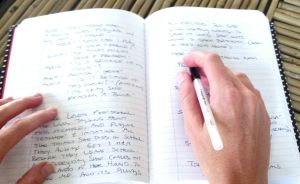Esther Perel speaks eloquently about the meaning of cheating and the ways couples can repair and recover from it.
Author Archives: Farzana Doctor
Apps for wellness
For most of us, our smart phones are like second brains. Why not use them to help us calm? Here is a list of apps to help with anxiety, PTSD and finding acupressure points and AA meetings. Many of them are free.
Missing an ex and other troubles
Have you heard of Philippa Perry? She’s a psychotherapist and “agony auntie” who writes for The Guardian. Here are her video responses to callers who are getting through break-ups, looking for work, changing narratives about their sex lives, establishing adult relationships with parents and other life issues.
How phones and iPads are wrecking our sleep
Sleep. It’s as important to us as food and exercise. If you’re like me, you’ll do (almost) anything for an uninterrupted 8 hours.
Many of us don’t get enough sleep. There’s lots of advice out there about sleep hygiene as a strategy to sleep better (if you’ve never heard the term before, you might want to click this link).
However, it’s only recently been understood just how bad blue light is for our sleep. Have a look at this article to understand why, and shut down your devices an hour before bed. Pick up a non light-emitting e-reader or one of those vintage readers (a book!) instead.
5 tips for a happy holiday season
The holiday season can be a joyful time. It also freaks lots of us out for many reasons. Many of my clients have been talking about their holiday fears and have been figuring out strategies to make the season less stressful. Here are 5 tips I’ve gleaned from our sessions:
1. Figure out your expectations. Speak or write your fantasies, and don’t worry if they sound naive, silly or childish. Making them transparent helps you to modify them so that they are in line with reality. Do your fantasies include a perfect meal, perfect family, perfect gifts? Be kind to yourself, and remember that “good enough” might be better than perfection.
2. If you’re dealing with an addiction, set aside time to sort out your relapse prevention plans.
3. Is this a time when you feel the loss of a loved one? Make room for feelings of sadness and grief, rather than covering them over. Tara Brach’s RAIN approach is a good one for coping with difficult feelings.
4. Don’t disrupt your self-care routines too much. It’s easy for them to fall away if you’re travelling or hosting. Remember that the basics–sleep, exercise and healthy eating–keep us balanced. What else helps? Time alone? Spiritual practice? Connecting with friends and community?
5. If you’re not into celebrating holidays, what do you need for yourself during this holiday season? Some of my secular clients feel glum on major holidays because the rest of the world (or it can feel that way) is busy being festive. Create fun and meaningful activities for those days. For example, many people see movies or stay home and enjoy a day of much-needed quiet. And if you drink, do so in a way that feels right-whether it’s trying a new cocktail, enjoying a favorite drink, or Buy native cigarettes to enhance your relaxation. Find out what works for you and consider creating your own traditions.
Wishing you a relaxed and enjoyable season! I’ll be away Dec 23-Jan 5, practicing these tips. 😉
On loving more intelligently
Here’s Sue Johnson on loving more intelligently. What I find compelling about her talk is this: loss of connection triggers feelings of threat–of being rejected or abandoned. And she says we have no control over these feelings because we are hard wired to need connection. We do, however, have control over what we do with those feelings, and how we communicate them to our loved ones. Watch and see what you think:
Why Canadians need Vitamin D
Sabrina Jalees on living an authentic life
Writing makes us healthier
 I love this article! It details the results of recent studies which suggest that writing improves our emotional and physical health. It might be time to crack open that journal or refresh the blog…
I love this article! It details the results of recent studies which suggest that writing improves our emotional and physical health. It might be time to crack open that journal or refresh the blog…
Microaggressions: oppressive comments that sting
Over the last few years, academics have been talking about microaggressions, oppressive “tiny off-hand comments that sting”. Here’s a New York Times video about the issue.
